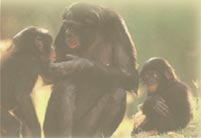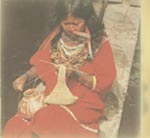


To download a PDF version of this syllabus click here.
Anthropology 150 On-Line: Human Origins and Culture
Fall 2004
Instructor: Dr. Mark Raab, Dept. of Anthropology
Contacts: 818 677 3575; mark.raab@csun.edu
Office: Center for Public Archaeology, Sierra Hall 262
Office hours: WF, 9:00-11:00, Sierra Hall 262. Please make an appointment.
Textbook: Anthropology: The Human Challenge, by William
A. Haviland, H. Prins, D. Walrath, B. McBride. 11th edition
Class Content and Requirements:
This class is an introduction to the field of Anthropology. Approximately
half of the class is devoted to a survey of human prehistory, emphasizing
the emergence of culture as a distinctively human adaptation, including
advances in technology and social organization, the spread of human populations
to diverse environments, the origins and consequences of food production
and the rise of civilization. The second half of the class examines the
sub-fields of socio-cultural Anthropology, surveying aspects of` world-wide
cultural variation. Students are expected to master the information presented
in the class textbook about these topics. Below is a schedule of the topics
to be considered each week, including the sections of the textbook to
be consulted. The class instructor will also post a video
presentation on this website at the beginning of each week, offering
guidance about the questions, issues and topics to which students should
pay particular attention.
Grading:
For purposes of grading, students will be evaluated in two ways:
Three multiple-choice exams, which can be taken on-line, will be posted at the WebCT site for this course at the the beginning of the weeks indicated below in the schedule of textbook readings. Each of these exams will consist of 50 questions, each worth 2 points. Students can earn a total of 300 points from these exams. Failure to take an exam within 24 hours of its posting will result in the loss of the points assigned to the exam.
Three essay questions will be posted at the beginning of each week. These questions are designed to help students organize their thinking about the topics under consideration each week. Each essay question is worth 25 points, for a possible total of 75 points each week. Answers to the essay questions should not exceed two pages per question. Students are expected to post answers to the essay questions to the instructor by 5:00 PM, Friday of each week using WebCT. Failure to post answers on time will result in the loss of the points assigned to these questions (exceptions may be provided at the discretion of the instructor only in cases of valid and verifiable emergencies). These essays will be graded on the basis of the following criteria:
- Have you included the names, dates and places important to this topic?
- Have you identified important background developments or topics that shaped investigation of the subject under discussion?
- Does the subject under discussion include significant controversies or differing schools of thought; if so, what are they and how do they influence what anthropologists have concluded about this topic?
- What are the major conclusions that have been reached about this topic?
Each student's final score for the class will be based on the total of the points earned from the three multiple-choice exams and the weekly essay questions. Letter grades, including + and - values, will be assigned on the basis of the class curve. This means that there are no absolute scores that translate into letter grades. Letter grades will depend on the performance curve for the class as a whole.
Please see the Exam Schedule of this site for exact dates and other pertinent information regarding the online exams for this course.
| Date | Topic | Textbook Chapters |
| Aug. 23-27 | Nature of Anthropology | Chapter 1 |
| Methods of Studying the Past | Chapter 2 | |
| Aug. 30-Sept. 3 | Biology and Evolution | Chapter 3 |
| Sept. 6-10 | The Modern Primates | Chapter 4 |
| Sept. 13-17 | Fossil Primates | Chapter 5 |
| Sept. 20-24 | Earliest Hominids and Culture | Chapter 6 |
| Sept. 27-Oct. 1 | Homo habilis and Cultural Origins | Chapter 7 |
| Homo erectus | Chapter 8 | |
| Oct. 4-8 | Archaic Homo sapiens | Chapter 9 |
| Homo sapiens | Chapter 10 | |
| Oct. 11-15 | FIRST EXAM | |
| Neolithic Revolution | Chapter 11 | |
| Cities and Civilization | Chapter 12 | |
| Oct. 18-22 | Modern Human Diversity | Chapter 13 |
| Nature of Culture | Chapter 14 | |
| Language and Communication | Chapter 15 | |
| Oct. 25-29 | Growing Up Human | Chapter 16 |
| Patterns of Subsistence | Chapter 17 | |
| Nov. 1-5 | Economic Systems | Chapter 18 |
| Sex and Marriage | Chapter 19 | |
| Nov. 8-12 | SECOND EXAM | |
| Family and Household | Chapter 20 | |
| Kinship and Descent | Chapter 21 | |
| Nov. 15-19 | Grouping | Chapter 22 |
| Political Organization | Chapter 23 | |
| Nov. 22-26 | The Supernatural | Chapter 24 |
| The Arts | Chapter 25 | |
| Nov.29- Dec. 3 | Culture Change | Chapter 26 |
| Anthropology and the Future | Chapter 27 | |
| Finals Week | THIRD EXAM | |